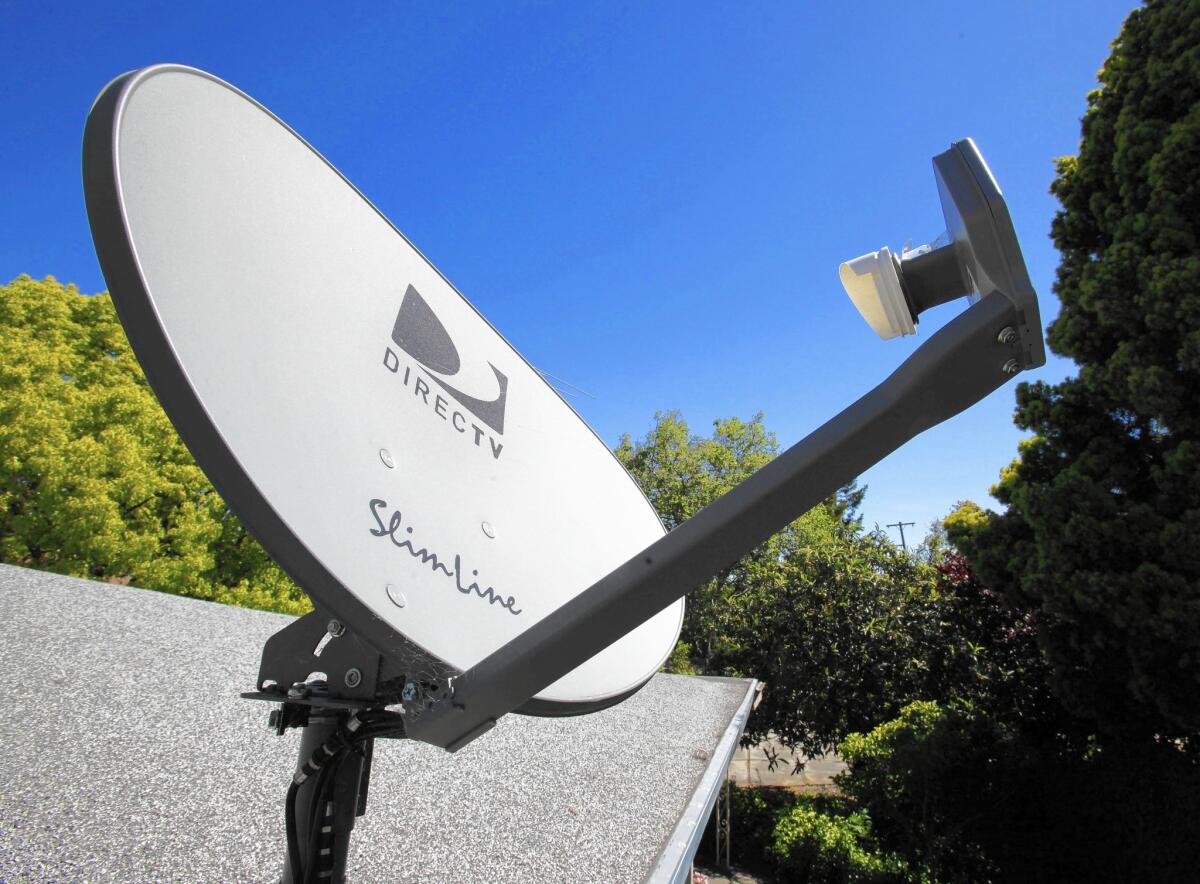FTC accuses DirecTV of deceptive ads, seeks ‘many millions’ in refunds

- Share via
Reporting from washington — The contrasting characters of Rob Lowe aren’t the only starkly different things in DirecTV’s commercials, federal regulators said: So are deals for subscribers that have higher costs than advertised buried in the small print.
The Federal Trade Commission on Wednesday accused the nation’s largest satellite TV provider of deceptive advertising for not clearly disclosing that a discounted 12-month package required a two-year contract that included a big rate hike in the second year and a hefty early termination fee if the customer wants out.
In addition, an offer for three free months of premium channels such as HBO and Showtime didn’t adequately disclose that customers would automatically be charged for them after the trial period unless they called to cancel, the agency said.
It’s the second time in recent years that the El Segundo company has been accused by government officials of misleading consumers. DirecTV paid $13.25 million in 2010 to settle similar allegations filed by attorneys general of California and 48 others states, as well as the District of Columbia.
The FTC suit seeks “many millions of dollars” in refunds for a “large” number of subscribers, officials said, declining to be more specific. The latest allegations date to 2007.
The action brought cheers from consumer advocates, along with a fine-tuned quip on the company’s heavy advertising.
“You can just imagine the TV ad: ‘I’m Rob Lowe, and here’s the price you’ll pay for DirecTV. And I’m Hidden-in-the-Fine-Print Rob Lowe, and we’re actually going to jack up your bill,’” said Delara Derakhshani, policy counsel for Consumers Union.
“We’re glad the FTC is going after these kinds of deceptive and misleading offers,” she said.
DirecTV denied the allegations.
“The FTC’s decision is flat-out wrong, and we will vigorously defend ourselves for as long as it takes,” the company said. “We go above and beyond to ensure that every new customer receives all the information they need, multiple times, to make informed and intelligent decisions.”
The company’s stock closed down 50 cents, or 0.6%, to $85.63.
Jessica Rich, director of the agency’s Bureau of Consumer Protection, said DirecTV tried to trick consumers with its ads.
The agency received thousands of complaints, and a “large portion” of the company’s 20 million subscribers would be entitled to refunds, she said.
“The company tells consumers to ‘ditch cable’ and switch to DirecTV to save money, and its advertisements claim that consumers can receive satellite TV packages for as low as $19.99 per month for 12 months,” Rich said. “Our complaint focuses on what DirecTV does not tell consumers.”
The Federal Trade Commission alleged that the company violated federal law by “making deceptive claims or omissions of material facts in advertisements and on its website.”
DirecTV failed to “clearly and prominently” disclose that 12-month packages required a two-year contract in which the monthly price more than doubled to $45 in the second year, the agency said.
An offer on DirecTV’s website Wednesday advertised that service was “Now Only! 19.99” a month. In much smaller type next to the offer, the ad said “with 24-mo agreement” and “plus addt’l fees.” The TV commercials featuring Lowe similarly have the small disclaimer below a large “Limited Time Offer” of $19.99 a month.
“Companies can’t hide important information from consumers to trick them into buying goods or services, and that’s what we allege DirecTV did in deceptively advertising its satellite TV services,” Rich said.
The suit said customers who wanted out of the deal had to pay an early termination fee of $20 for each month remaining on their contract.
In the case settled in 2010, state prosecutors alleged that DirecTV offered special deals with hidden costs, such as higher prices in the second year. DirecTV also was accused of extending customers’ contracts without their knowledge and failing to deliver promised sports channels and other programming.
In that settlement, DirecTV agreed to “clearly and conspicuously disclose, in direct proximity” to an advertised price, all “material limitations” on all future offers.
A spokesman for California Atty. Gen. Kamala Harris did not return a call for comment on whether the new FTC allegations could constitute a violation of the prior settlement terms.
More to Read
Inside the business of entertainment
The Wide Shot brings you news, analysis and insights on everything from streaming wars to production — and what it all means for the future.
You may occasionally receive promotional content from the Los Angeles Times.











